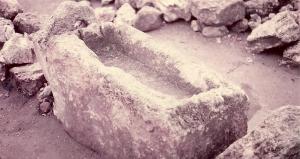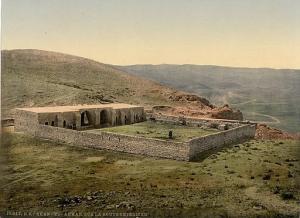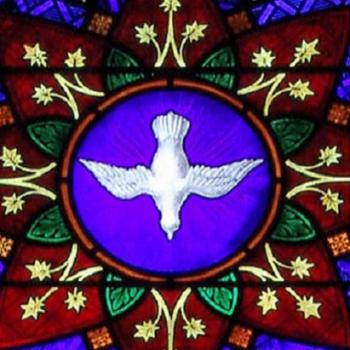It was not an “inn” where there was no room for Jesus’ birth. The proof is in Mark 14:14 (= Luke 22:11), where Jesus books the same kind of place to eat the Last Supper. “Guest room” seems to be the best way to translate the Greek term katalyma used here and in Luke 2:7. The word pandocheion, used in Jesus’ parable of the Good Samaritan (Luke 10:34), is the word for what we would understand as an inn. Since katalyma is only used three times in the New Testament, a look at the fourteen times katalyma is used in the Greek translation of the Hebrew Bible is in order.

In the Septuagint, the first time katalyma is used is in Exodus 4:24, where God meets Moses at a “lodging place” on the way back to Egypt and seeks to kill him; here, it likely means a camping place rather than a structure. Similarly, in 1 Samuel 1:18, Hannah and Eli are staying in a katalyma somewhere near the sanctuary in Shiloh, where they have come for an annual sacrifice (no word for lodging place is mentioned in the Hebrew text).
In 1 Samuel 9:22, katalyma appears to mean “banquet hall,” as it does in Mark 14:14 = Luke 22:11; here, it is where Samuel hosts Saul and his servant for a meal, along with about 30 townspeople. In 1 Chronicles 28:13, the Greek adds a reference to katalymata to describe accommodations which Solomon builds for the priests who will serve in the Temple.
God’s katalyma is first mentioned in Exodus 15:13, where it refers to God’s holy “habitation,” meaning either Sinai or possibly the Temple Mount, the place where God “lodges.” Similarly, when God kindly declines David’s offer to build him a house, God states that he has been living just fine in a katalyma and a tent (2 Samuel 7:6 = 1 Chronicles 17:5).
Out of the three times that katalyma is used in the Greek translation of Jeremiah, twice it refers to lodging places in the wilderness (14:8; 40:12), and once to a lion’s lair (32:38). Ezekiel 23:21 criticizes Oholibah the nymphomaniac for letting the Egyptians handle her breasts “at your lodging place” (another place where the word katalyma is added where there is no corresponding word in the Hebrew). And later on during the rule of the Greek king Antiochus IV, we are told in 1 Maccabees 3:45 that “Jerusalem was uninhabited like a desert… The sanctuary was trampled down, and aliens were in the citadel; it was a katalyma for the Gentiles.”

To give us an idea how bad the public inns were, Clement of Alexandria (Stromateis 2.20.114.5) quotes the second-century AD Gnostic Valentinus, who says the heart is like an inn, which also “has holes bored in it and dug in it and is often filled with kopros [dung] where people stay there and behave outrageously (aselgōn, a word for shocking sexual excess) with no consideration for the place, as if it were nothing to them.”
The Jewish philosopher Philo uses the image of being “soiled and abused like someone entering a pandocheion.” A lost fragment of Philo states that a pandocheion is a place where people “fill themselves and vomit in their passions.” In the second-century AD Egerton Gospel Fragment line 8, a man says to Jesus, “While traveling and eating with lepers in the pandocheion, I myself also became a leper.” (The barn is starting to sound better and better.)
Josephus (Antiquities 3.376) gives a list of the types of women a priest is forbidden to marry, including women who earned their living by innkeeping (pandocheuein), apparently because so much of the time the job involved practicing prostitution. Even worse, the rabbis declared that cattle cannot be trusted with Gentiles at an inn, because they practice bestiality (Mishnah, Abodah Zarah 2:1). An inscription at a Roman inn included wine and bread for one Roman as (one sixteenth of a denarius), pulmentarium (food to go with the bread) for two asses, hay for the mule for two asses, and a “girl” for eight asses.
Rabbinic Hebrew borrows the Greek term pandocheion in the form pundaq. In the Mishnah, the word is used in a case where a man dies at an inn on the road to the Dead Sea, possibly the very spot Jesus has in mind in his parable in Luke 10. The rabbis are looking for evidence to prove that the man died, so that the widow can remarry. The rabbis accept the lone testimony of the woman innkeeper, but they do so because she is able to present the man’s staff, bag and Torah scroll as evidence (Yebamoth 16:7).
Yes, our Lord had a manger for a crib, but at least he wasn’t born in a pandocheion. That would have been truly the bottom of the barrel.











